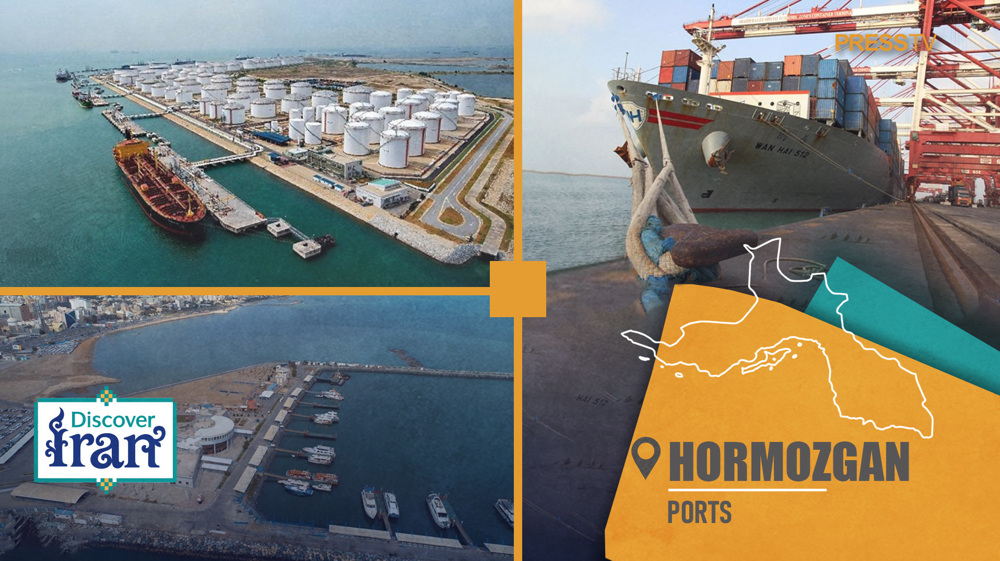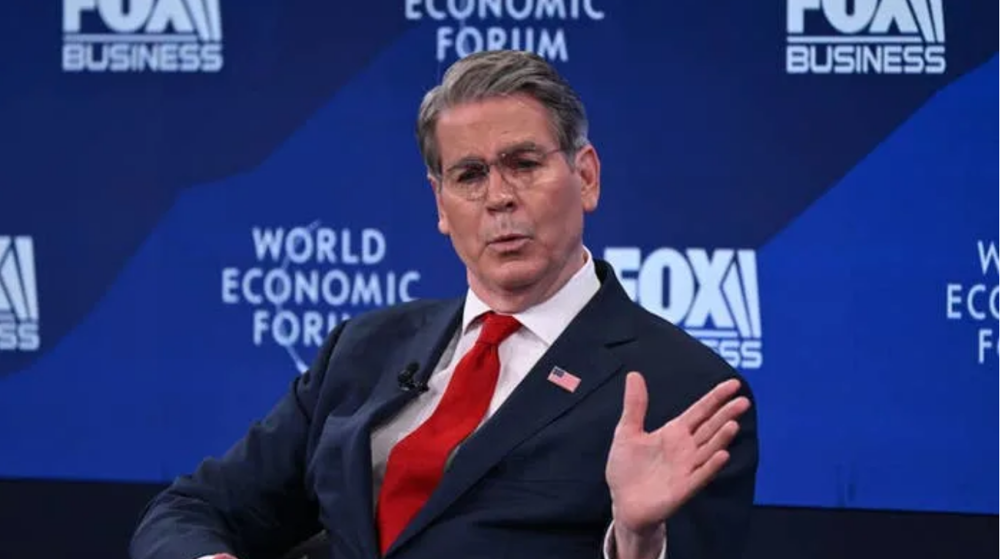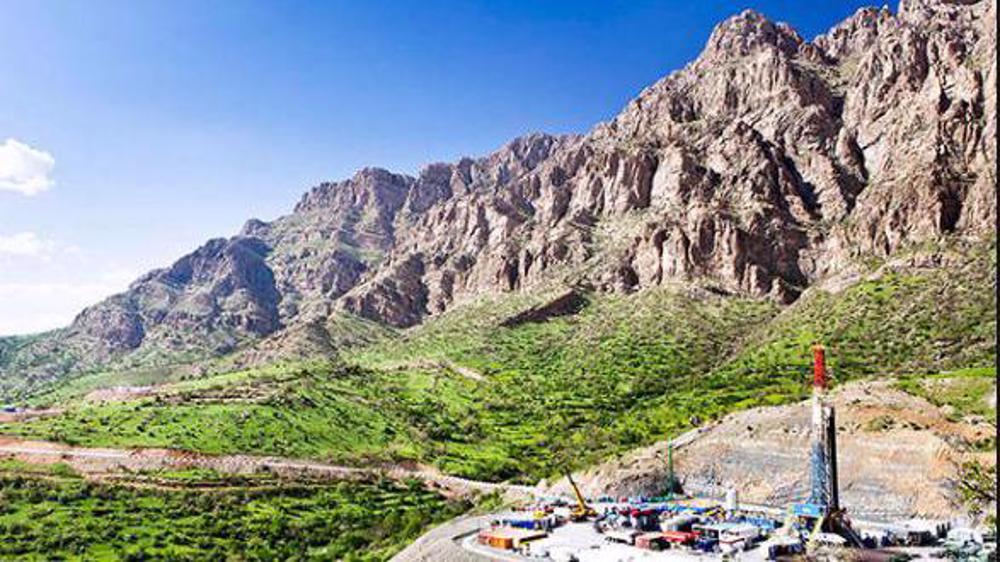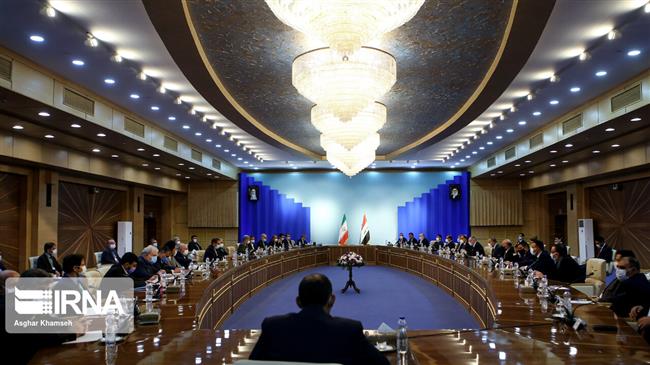Iran, Iraq see off Trump with new push to expand trade ties
Iraqi Trade Minister Alaa Ahmed al-Jubouri is visiting Iran to remove hurdles to further expansion of economic relations which are the target of US sanctions.
The two Muslim neighbors are holding their fourth Joint Economic Committee meeting in Tehran after a six-year hiatus, with Iranian Energy Minister Reza Ardakanian saying they will sign new agreements in the fields of water and energy.
Since 2018, Iran and Iraq have set a five-year target to increase bilateral trade to $20 billion per year – a vision which Ardakanian reiterated on Tuesday - but it has been hampered by a combination of restrictions caused by the COVID-19 outbreak, trade barriers and US sanctions.
Jubouri said he had arrived in Tehran Tuesday with a high-ranking delegation “to remove obstacles to increasing trade between the two countries”, Fars news agency reported.
The Iraqi minister underlined the importance of modern technologies which the two countries need to use in their transactions in order to improve their economic relations.
Ardakanian said they needed new cooperation agreements on taxation, investment, preferential tariffs, and customs. The Iranian minister also underlined the importance of developing transportation routes between the neighbors.
In March 2019, they signed a preliminary agreement to build a railway linking the southern Iraqi oil city of Basra and the Iranian border town of Shalamcheh when President Hassan Rouhani visited Baghdad.
Apart from religious and cultural connections, Iran and Iraq share a nearly 1,500-kilometer-long border. Iran is one of Iraq’s biggest trading partners and the Arab country’s large consumer market is ideally suited to Iran’s non-oil trade plans.
US President Donald Trump’s decision in May 2018 to pull out of a landmark nuclear deal with Iran has pushed the Islamic Republic to try to expand commercial ties with neighbors.
However, Iran’s forays into the Iraqi market where products from the eastern neighbor are deemed better suited to the tastes and standards of the Iraqis have faced mulish pushbacks from the United States.
Washington has especially a beef with Iran’s gas exports on which Iraq relies to feed its power grid.
While having to extend waivers to Iraq to continue importing Iranian gas since Trump restored sanctions on Iran’s vital energy sector in November 2018, the US has tried to enlist its companies and regional allies to replace the Islamic Republic as the source of energy.
Iraqi officials, however, say there is no easy substitute to imports from Iran because it will take years to adequately build up Iraq’s energy infrastructure.
Iraq’s economy has been battered by years of wars, US sanctions and a subsequent invasion of the country and a foreign-backed takfiri insurgency. It is further in dire straits as a consequence of global oil price slump.
Iraqi leaders say American demand acknowledges neither Iraq’s energy needs nor the complex relations between Baghdad and Tehran. After all, Iran ties cannot be compared to Iraq’s relations with an occupying country like America.
Jubouri on Tuesday stated that much of Iraq's energy needs come from Iran as he ruled out any immediate plans for gas imports from other sources, including Turkey where oil and gas pipelines from the Caspian Sea meet.
“We do not currently have any plans to import gas from Turkey,” the Iraqi trade minister said.
Iraq glad to see back of Trump
Experts say the Iraqis are more than glad to see the back of Trump who made scuttling Tehran’s vital relationship with Baghdad a centerpiece of his gung-ho policy.
Iran’s iconic anti-terror commander General Qassem Soleimani was on an official visit to Iraq when his convoy was targeted at Baghdad airport a year ago, killing him and his Iraqi fellow commander Abu Mahdi al-Muhandis.
The new diplomatic rendezvous in Tehran sounds like a celebration of Trump’s imminent departure from the White House with a new push to buttress trade relations between Iran and Iraq.
“The presence of a high-ranking Iraqi delegation at the Tehran meeting demonstrates our seriousness in cooperating with the Islamic Republic of Iran in order to eliminate the existing obstacles and identify technical needs of Iraq, and to take the necessary measures in an operational manner,” Jubouri said.
He said the coronavirus pandemic has created a new climate in global relations, which calls for a revision of economic agreements according to the current situation.
“Countries dependent on oil revenues under the coronavirus epidemic are facing challenges, and those relying on non-oil resources are more successful than others,” Jubouri said.
The pandemic has led to border closures and disruptions to trade and visits by millions of pilgrims and tourists.
Last month, the Iraqi government allowed travel of passengers from Iran just two days after it announced borders would close for two weeks over fears about the spread of a new variant of the coronavirus.
Head of the Iran-Iraq joint chamber of commerce Yahya Ale Es’haq said in April exports of Iranian goods and services to Iraq were down at $11 billion year on year in February from $13 billion in 2019, affected by the coronavirus.
Ardakanian said, “In the field of energy, electricity and gas, as well as water resources, we are ready to operationalize agreements reached before and formulate new agreements within the framework of existing legal agreements.”
The minister also announced Tehran's readiness to establish a joint investment fund to support supply of engineering and technical services to Iraq.
Iran FM: EU’s blacklisting of IRGC a ‘major strategic mistake’
VIDEO | Pakistan’s legal community condemns UNHRC anti-Iran resolution
Resistance groups announce volunteer recruitment to defend Iran
Indians rally to condemn Trump's threats against Ayatollah Khamenei
VIDEO | Iran will devastate Israel if it cuts loose
Sunni MPs condemn Trump’s insult, affirm support for Iran’s Leader
1,000 strategic drones officially join combat units of Iranian Army
VIDEO | Germany, not just merely an economic recession














 This makes it easy to access the Press TV website
This makes it easy to access the Press TV website